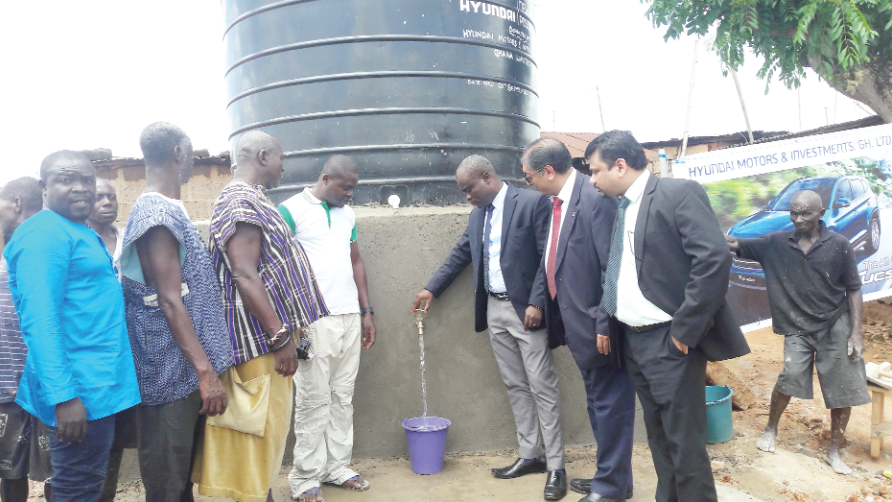The Head of Human Resource of Hyundai Motors, Mr Emmanuel Lamptey, turning on the tap. Looking on are the Country Director of the company, Mr Mahesh Mahtani, Brand Manager, Mr Ganesh Phadale, the chiefs and some residents of the community.
The facility which was financed by Hyundai Motors and Investment (Ghana) Limited at a cost of GH¢250,000, is fitted with a pump and a water reservoire for water storage.
The new borehole has come to relieve residents of the stress of having to walk far distances to streams to fetch water or stand in long queues at the community’s existing borehole to await their turn.
The community’s only stream, Opantum, can no longer be relied on as it dries up regularly during the dry season.
The Country Director of Hyundai Motors and Investment (Ghana) Limited, Mr Mahesh Mahtani, said the company constructed the borehole in view of the periodic water shortages the community faced.
“This is the first town we are giving water and hope to construct another one in a different village in about three months’ time,” he said.
According to the director, the company planned to construct a borehole each in five selected communities over the next five years as part of its corporate social responsibility.
Significance
The chief of the community, Nana Mankrado Addo Larbi, described the intervention as timely.
He said even though the community did not suffer from any water-borne diseases, its greatest worry was the use of agrochemicals in farming which polluted the Opantum stream.
“The community is growing big and our greatest fear is fetching water from the stream which is polluted with agro chemicals,” he stated.
Nana Larbi gave an assurance that the project would be well-maintained and that a committee had been set up to ensure that.
He said members of the community, who fetched water from the borehole, would be charged a token fee.
The Assembly Member for the Fotobi Electoral Area, Godfred Ayi Tetteh, praised Hyundai for the intervention saying, “now our children and market women can go to school and market early. We are going to do everything possible to keep the facility running.”
Statistics
Available statistics indicate that Ghana met the Millennium Development Goal (MDG) on drinking water accessibility in 2010. The goal called for halving the proportion of the world’s population that lacked sustainable access to safe drinking water between 1990 and 2015. Ghana met that goal five years ahead of schedule.
However, realities in rural communities in the country indicate that the water sector still requires more investments to make it acessible to all.


